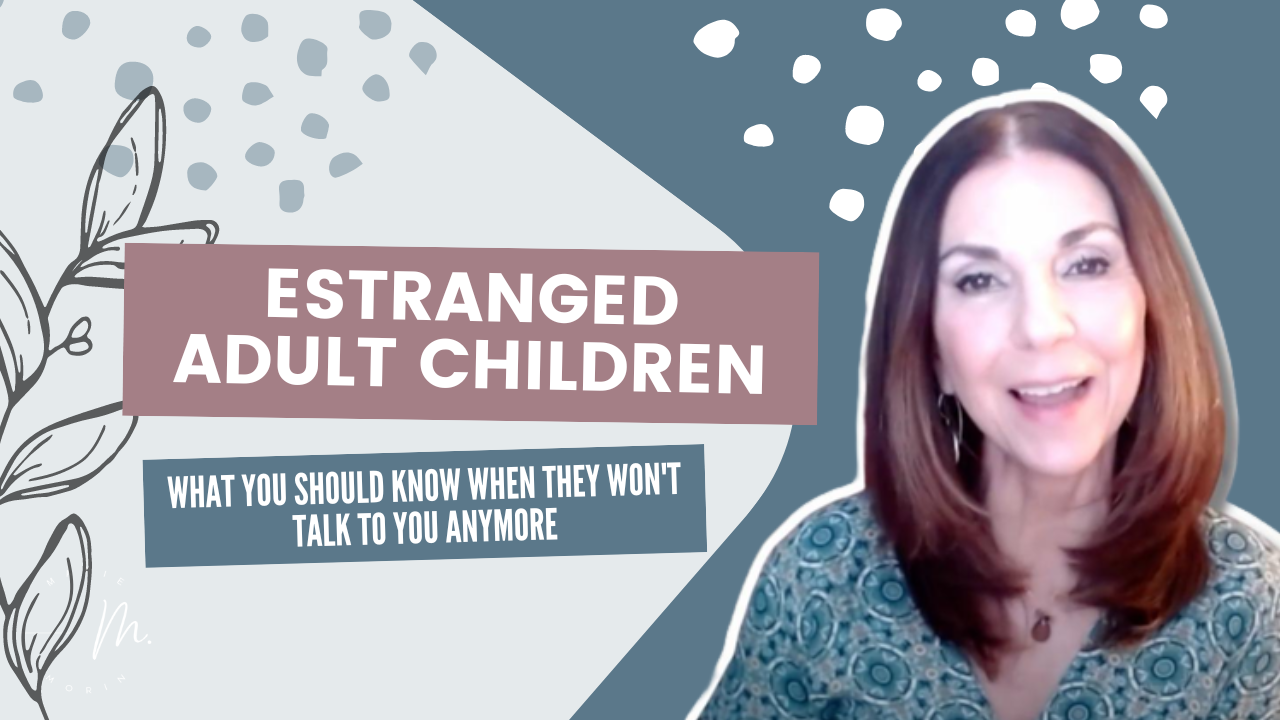Is your adult child not talking to you anymore? In this article, we discuss some things that may be going on with your adult child and how to cope with the grief.
Understanding Estrangement
Estrangement is the widespread and stigmatized condition describing cutting off one family member from one or more family members. Estrangement can be total cutting ties with no contact or little contact with emotional distancing. When an adult child cuts ties with one or both parents, they choose to disconnect from a relationship they believe is unmanageable.
Historically, toxic and abusive relationships between parents and adult child behaviors inflict unsustainable harm. Over time the adult child struggles with maintaining contact, especially when conflict is persistent. Often a monumental event precedes the cut-off; however, the adult child’s decision to cut off did not occur suddenly or without angst. Emotional and physical distancing comes out of a need to self-preserve.
The Aftermath
As a parent, you will likely experience a lot of hurt resulting from your child’s decision. You’ll experience grief, sadness, anger, guilt, anxiety, shock, and denial. Understandably, you’ll desire a resolution, reconciliation, and a return to closeness. For all parties, there is a lot of pain. There may be an opportunity for reconciliation, but the problem, according to the adult children, must be resolved for the relationship status to change.
The reality is that adult children are looking for you to change. Estrangement is complicated- it has tentacles in many different areas of the relationship. In some relationships, the adult child cuts the parent off but then will have sporadic contact. The adult child can be emotionally distant, and some parents occasionally see them. But it can be extremely challenging to bear when there is a total cut-off and no contact. You may have been told things about your behavior and find it hard to believe. But according to your adult child, something happened.
Recognizing Toxic Behaviors
Adult children often remove themselves when their parents have been toxic, narcissistic, or abusive. Toxic behaviors and estrangement can alter one’s mental state. More specifically, children raised in unhealthy homes will suffer psychological harm. Harmful and toxic behaviors include:
- They are overly reactive and self-centered.
- They are consistently disapproving and discouraging.
- They cannot assume responsibility for their actions.
- They dismiss the other’s thoughts and feelings.
- They disrespect each other’s boundaries.
- They disregard the other through humiliation.
- They are psychologically manipulative to create doubt in the other’s sanity.
- They use controlling tactics and have angry outbursts.
To learn more about why adult children choose to estrange themselves from their parents, watch my video: Estranged adult children: Why they cut off.
Shifting Your Perspective
It’s helpful to look at the situation from the child’s perspective. More than likely, it took a lot of work for the adult child to make the decision. The decision becomes apparent after a long time of challenging exchanges and may result from a volcanic event. Adult children estrange themselves for self-preservation because they are in pain, and continuing in the relationship harms them. They feel like they cannot resolve the problem.
As adults, your adult children can decide if the relationship is working for them. If they have cut you off, they have agreed that the relationship is untenable for their emotional health. Adult children want you to respect their decision and validate how they feel. You may feel uncomfortable, but dismissing their choice won’t help if you would like to reconcile someday.
Addressing Grief
It can be shocking and deeply lonely when you become estranged from someone you love. The disbelief, overwhelm, and grief is different than when you lose a child to death when you know that your child has chosen to separate. This feeling can be incredibly heartbreaking.
Often when we are sad, we tend to pull away from others which further heightens our feelings of aloneness. This sadness can then lead to a state of extended depression. Although it is normal to experience sadness and hopelessness when your adult child cuts ties with you, remember that there is a way out of your mental rut.
According to research, adult children tend to soften with time and age. Knowing this possibility can give you some hope for the future to resume your relationship with your adult child. With that, acceptance of the current state of the relationship is critical. Acceptance is when you can recognize that you cannot control the situation.
Feelings of guilt may also arise when you become estranged from your loved one. Thoughts like “What could I have done differently?” or, “How could I have said that to them?” etc. Dwelling on guilt can take up an enormous amount of mental space. Remember that we are imperfect beings, and we make mistakes. Becoming angry with your current state of estrangement is also very common. Especially paired with feelings of uncertainty, this can be paralyzing. You’re not alone in this.
To learn more about jumpstarting your healing, read my recent blog posts:
HOW TO MOVE PAST THE WOUNDS OF ESTRANGEMENT AND FIND RELIEF
Adult child cut off? How to Overcome Anxiety and Heal Your Nerves
Estrangement Resources
Morin Holistic Therapy
Marie Morin MA LMHC
morinholistictherapy@gmail.com
Books
Agllias, Kylie. Family Estrangement A Matter Of Perspective. New York, Routledge, 2017.
Coleman, Joshua. Rules of Estrangement. New York, Harmony Books, 2020.
Pillemer, Karl. Fault Lines Fractured Families and How to Mend Them. New York Penguin Random House, 2020.
EBook
Morin, Marie. Feeling Heartbroken and Alone? How to Pick Up the Pieces When You are Estranged. eBook. 2022.
Articles
Morin, Marie. How to Deal with Estranged Family During the Holidays (2021, November 21) Sixty and Me. https://sixtyandme.com/estranged-family-holidays/
https://morinholistictherapy.com/blog/
Videos
Morin Holistic Therapy YouTube Channel
https://www.youtube.com/@youtubemariemorinestrangement
Morin, Marie. [Morin Holistic Therapy]. (2021, September 8). Diaphragmatic Breathing: 5-Minute Deep Breathing Exercise for Beginners.
Morin, Marie. [Morin Holistic Therapy]. (2022, January 4 ). What is Family Estrangement? You Are Not Alone.









